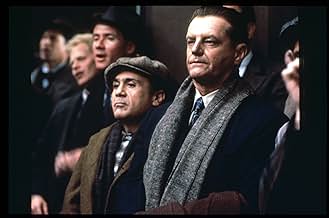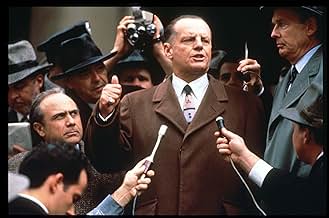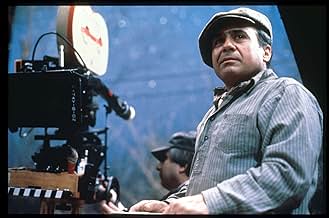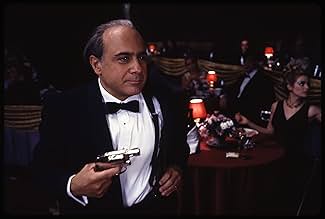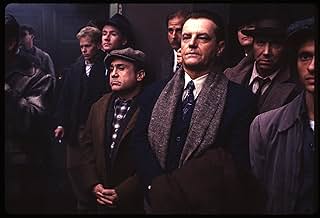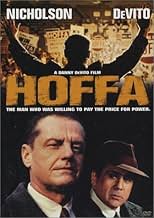AVALIAÇÃO DA IMDb
6,6/10
26 mil
SUA AVALIAÇÃO
A história da famosa figura da união americana Jimmy Hoffa, que organiza greves, lida com membros do sindicato do crime organizado e desaparece misteriosamente em 1975.A história da famosa figura da união americana Jimmy Hoffa, que organiza greves, lida com membros do sindicato do crime organizado e desaparece misteriosamente em 1975.A história da famosa figura da união americana Jimmy Hoffa, que organiza greves, lida com membros do sindicato do crime organizado e desaparece misteriosamente em 1975.
- Indicado a 2 Oscars
- 2 vitórias e 6 indicações no total
Joe Greco
- Loading Foreman
- (as Joe V. Greco)
Avaliações em destaque
While it is one of Nicholson's most challenging roles, as a viewer you find yourself more attached to director and co-star DeVito, who practically sunk every penny he owned into the making of this film. While the film did garner some Golden Globe nominations, altogether the film was a commercial and personal flop for all involved. The problem may have been that the world was not ready for this story. Nicholson is quite good as Hoffa, but one almost ignores the performance when you think of the personal attachment director DeVito had to the project. It is quite unfortunate because DeVito is interesting in a rare dramatic role. David Mamet did write a fine script and there is fine support from J.T.Walsh, Robert Prosky and Armand Assante.
In ten years, this film will be a classic!
In ten years, this film will be a classic!
Before I had seen Hoffa I was aware of the Union leader mainly for his disappearance and the jokes made about his last resting spot. My dad had always considered Hoffa a hero simply because he didn't buckle under to the big boys he fought them. Hoffa The movie captures the Essence of James R Hoffa perfectly. This is Nicholson's Finest role forget the Joker in Batman or Jack Torrence in THE SHINING. This is pure acting 100% You cannot tell where Hoffa the part and Nicholson the actor leave off. The movie moves from Flashbacks to Hoffa's last day on Earth and it makes you wonder about What happened to him. During the flashbacks we See Hoffa slowly emerging as a force within the Teamsters Union slowly gathering influence and power from the ranks of the working man. The Film fits the various Eras portrayed perfectly. It's like looking thru a window. The Corruption of Hoffa if you can call it that is slow and gradual and Hoffa's War With Bobby Kennedy is simply fantastic film making Devito didn't want to spoil the scene with words so he used the actual Hoffa Kennedy exchanges word by word word for word. And Nicholson must've studied that footage intently as he captures Hoffa's Every movement and even his eyes down to the rapid movements that Hoffa did. Devito knows his stuff and Proves it here. Great Film that deserves to be remembered as a true original CLASSIC! Just like the original James R. Hoffa a original classic.
James Riddle Hoffa was probably one of the most enigmatic union leaders in this history of our country. As an important labor organizer during the over the road trucker strikes in the 1930s, he accomplished many things that made possible the emergence of the Teamsters Union as a major political force for several decades afterward. At the same time, he fell into a trap that bedevils many a fighter who perceives her/himself as a "people's champion"- he convinced himself that he had to fight fire with fire, and in the end, it devoured him. Secondly, Hoffa did not have the money, the support or the political sophistication of a Robert Kennedy. This'll finish you in the United States. Despite all our bombast about law and order, the country loves its shady political characters charming and slick, or the medicine show man, witness: Clinton, Reagan, Bush. The awkward and openly coarse need not apply, witness Nixon, Hoffa, Lott. David Mamet understands that, and that's why his version of Hoffa's life works.
Mamet's Hoffa knows the Kennedy family built their fortune out of rum running to a large extent, and he sees no difference between their corruption and his own compromises. At least, Hoffa tells himself, his own deals with the devil serve something larger then his immediate family, they serve the membership of the union. And this was very true, which is why a fair number of Teamsters still swear by the name Jimmy Hoffa. Nicholson's snide asides to his "betters" completely captures the class war basis that motivated the actual man's actions. Anyone who has been through an actual labor dispute and has been witness to the patronizing communications that come through a company eager to crush a union effort knows full well what fired up Jimmy Hoffa, even as we turn aside from the path he took.
The film succeeds because De Vito, Nicholson and Mamet understand what pushed the labor movement forward, and they understand its contradictions. Most important, they understand why those contradictions overwhelmed a man as gifted as Jimmy Hoffa, and this is what makes it better then your average Hollywood drama about labor. Hoffa is a film about working class attitude that gets beneath the usual dismissals of working class concerns, and as such, deserves respect. The powers that be have every legend about their leadership. It's time the working class was allowed legends about its own once again, provided we understand that they are legends, and therefore laden with much myth. The very real larger then life qualities of Jimmy Hoffa, however, make this a film worth more then one critical glance.
Mamet's Hoffa knows the Kennedy family built their fortune out of rum running to a large extent, and he sees no difference between their corruption and his own compromises. At least, Hoffa tells himself, his own deals with the devil serve something larger then his immediate family, they serve the membership of the union. And this was very true, which is why a fair number of Teamsters still swear by the name Jimmy Hoffa. Nicholson's snide asides to his "betters" completely captures the class war basis that motivated the actual man's actions. Anyone who has been through an actual labor dispute and has been witness to the patronizing communications that come through a company eager to crush a union effort knows full well what fired up Jimmy Hoffa, even as we turn aside from the path he took.
The film succeeds because De Vito, Nicholson and Mamet understand what pushed the labor movement forward, and they understand its contradictions. Most important, they understand why those contradictions overwhelmed a man as gifted as Jimmy Hoffa, and this is what makes it better then your average Hollywood drama about labor. Hoffa is a film about working class attitude that gets beneath the usual dismissals of working class concerns, and as such, deserves respect. The powers that be have every legend about their leadership. It's time the working class was allowed legends about its own once again, provided we understand that they are legends, and therefore laden with much myth. The very real larger then life qualities of Jimmy Hoffa, however, make this a film worth more then one critical glance.
Written with callous virtuosity by Mamet, directed with garishly vintage technique by DeVito, this hugely underrated, passionate, powerful film not only portrays Hoffa with the enhanced corporal magnitude of Nicholson, who gives a massive thrust of a performance, but it also reshuffles the ladder of American heroes as it's recognized nowadays. Several may be uneasily startled: This stylistic take on the life and mysterious disappearance of the Teamsters Union leader views Robert Kennedy as seen by Hoffa: a bellyaching Harvard-educated well-to-do, frantic for exposure, prepared to use evenhanded ways and biased to catch Hoffa, no equal at all for Hoffa in their incensed altercations.
In the context of most commercial movies, which insist on explaining too much or repeating the obvious, Hoffa remains a reasonably detached consideration of the career of a man whose ties to the Mafia not only cost the rank-and-file teamsters millions but also set a pattern for corruption that tainted the entire labor movement. It's a quintessentially American story, for only here did Big Labor become a big business to rival Big Business.
DeVito and the Great Character Development Skeptic neither romanticizie him or try to explore Hoffa outside his own mechanical justification that you have to do it to others before they do it you. Without commentary, in very broad strokes, they authenticate Hoffa's advancement from minor reformer to big-time shark, power-dealer and mob friend.
The movie opens as the edgy, dog-tired Jimmy, convoyed by his committed odd-job guy, conjured character Bobby, waits in a Cadillac in a Detroit cafeteria lot for a rendezvous with an abiding Mafia accomplice. The reminiscences that are the bulk of the film aren't Jimmy's, but the indulgent, diligent Bobby's. He worries about Jimmy's state of affairs, remembering their first meeting in the Depressed 1930s when, one night on the road, Jimmy invited himself into his truck and tried to enlist him for the teamsters. Jimmy was then something of an optimist. As the hours drone on in the lot, Bobby sequentially recalls his way through Jimmy's career.
While Bobby's remembrance is tender, this captivating, hazy biopic sees all coolly. This gives this forgotten '90s drama an indignantly cynical tone that is generally uncommon in American movies. It compels us to decide for ourselves, something that can be infinitely puzzling as well as gratifying. The film proposes there are occasions when one must reason for oneself. It doesn't pose as a docudrama or anything close. It's a skillful work of fiction, rooted in fact, devised with ingenuity and a dependable viewpoint.
DeVito's direction is crammed with overstated kinesics that appear wholeheartedly consistent with Bobby's exceedingly highlighted reminiscences of life with Jimmy. There are numerous striking overhead shots, whether it's a scene of Jimmy incarcerated or a panoramic view of union men wrestling scabs. Simultaneously, DeVito knows when to use close-ups, that is, to divulge character instead of to intersperse dialogue. When the director shows a recalled explosion and fire, they have the massive scope of something recounted in an anecdote told late at night in a favorite dive.
It comes as a surprise, about midway through, to learn that the Teamsters head has a wife and daughter. They appear during a crowd scene. But this film about Jimmy Hoffa has no time to show him meeting his wife, dating her, marrying her, finding their dream house, having a kid. That's about as it should be.
Does the movie grant that Jimmy was an instrument of organized crime? Not by any means. Nor does it quite maintain that Hoffa would take any advantage he could get, anywhere he could, to systematize the drivers and press-gang the bosses. He was a union realist, but what makes this movie so beguiling is that we can never entirely peep the romanticism that should be in there somewhere, no glow of internal principle. Something murky must be driving him on a lonesome, ruthless revenge.
Nicholson is an actor who can echo virtually anything in his face. His intense, volcanic performance is so good as Hoffa because he betrays virtually nothing. When we first see him, the corporal embellishments are striking. He's filled with spite, not optimism. He organizes for the same reason other guys get in bar fights, because it discharges the intense stresses within.
The production is plentiful with period particulars, consecutively in an enduring procession. The truckers' world distinguishes with the world of control occupied by the insiders: The Old World sophistication of the Mafia sociables, for instance, or the rooms where dominant government men dwell. The movie makes its implicit case for union organizing simply by complementing the cabs and roadstops of the drivers with the world of opportunity.
This is an inspired and vibrant piece, but is that sufficient? It sharply divided critics, but for me it is. Others will have valid protests to the ways the film works. This genuinely absorbing piece reveals DeVito as a sincere filmmaker. He extracts the core guise and pitch for this material. Not every director would've been self-assured enough to purely show us Jimmy Hoffa rather than narrating all about him. This is a movie that finds its impact between the lines, in what is unstated.
In the context of most commercial movies, which insist on explaining too much or repeating the obvious, Hoffa remains a reasonably detached consideration of the career of a man whose ties to the Mafia not only cost the rank-and-file teamsters millions but also set a pattern for corruption that tainted the entire labor movement. It's a quintessentially American story, for only here did Big Labor become a big business to rival Big Business.
DeVito and the Great Character Development Skeptic neither romanticizie him or try to explore Hoffa outside his own mechanical justification that you have to do it to others before they do it you. Without commentary, in very broad strokes, they authenticate Hoffa's advancement from minor reformer to big-time shark, power-dealer and mob friend.
The movie opens as the edgy, dog-tired Jimmy, convoyed by his committed odd-job guy, conjured character Bobby, waits in a Cadillac in a Detroit cafeteria lot for a rendezvous with an abiding Mafia accomplice. The reminiscences that are the bulk of the film aren't Jimmy's, but the indulgent, diligent Bobby's. He worries about Jimmy's state of affairs, remembering their first meeting in the Depressed 1930s when, one night on the road, Jimmy invited himself into his truck and tried to enlist him for the teamsters. Jimmy was then something of an optimist. As the hours drone on in the lot, Bobby sequentially recalls his way through Jimmy's career.
While Bobby's remembrance is tender, this captivating, hazy biopic sees all coolly. This gives this forgotten '90s drama an indignantly cynical tone that is generally uncommon in American movies. It compels us to decide for ourselves, something that can be infinitely puzzling as well as gratifying. The film proposes there are occasions when one must reason for oneself. It doesn't pose as a docudrama or anything close. It's a skillful work of fiction, rooted in fact, devised with ingenuity and a dependable viewpoint.
DeVito's direction is crammed with overstated kinesics that appear wholeheartedly consistent with Bobby's exceedingly highlighted reminiscences of life with Jimmy. There are numerous striking overhead shots, whether it's a scene of Jimmy incarcerated or a panoramic view of union men wrestling scabs. Simultaneously, DeVito knows when to use close-ups, that is, to divulge character instead of to intersperse dialogue. When the director shows a recalled explosion and fire, they have the massive scope of something recounted in an anecdote told late at night in a favorite dive.
It comes as a surprise, about midway through, to learn that the Teamsters head has a wife and daughter. They appear during a crowd scene. But this film about Jimmy Hoffa has no time to show him meeting his wife, dating her, marrying her, finding their dream house, having a kid. That's about as it should be.
Does the movie grant that Jimmy was an instrument of organized crime? Not by any means. Nor does it quite maintain that Hoffa would take any advantage he could get, anywhere he could, to systematize the drivers and press-gang the bosses. He was a union realist, but what makes this movie so beguiling is that we can never entirely peep the romanticism that should be in there somewhere, no glow of internal principle. Something murky must be driving him on a lonesome, ruthless revenge.
Nicholson is an actor who can echo virtually anything in his face. His intense, volcanic performance is so good as Hoffa because he betrays virtually nothing. When we first see him, the corporal embellishments are striking. He's filled with spite, not optimism. He organizes for the same reason other guys get in bar fights, because it discharges the intense stresses within.
The production is plentiful with period particulars, consecutively in an enduring procession. The truckers' world distinguishes with the world of control occupied by the insiders: The Old World sophistication of the Mafia sociables, for instance, or the rooms where dominant government men dwell. The movie makes its implicit case for union organizing simply by complementing the cabs and roadstops of the drivers with the world of opportunity.
This is an inspired and vibrant piece, but is that sufficient? It sharply divided critics, but for me it is. Others will have valid protests to the ways the film works. This genuinely absorbing piece reveals DeVito as a sincere filmmaker. He extracts the core guise and pitch for this material. Not every director would've been self-assured enough to purely show us Jimmy Hoffa rather than narrating all about him. This is a movie that finds its impact between the lines, in what is unstated.
I have no interest in the life of Jimmy Hoffa, and I am predisposed to disliking the man even before the first frame of Hoffa is run. But I do watch, knowing the film is from a very good David Mamet script, knowing that I want to be convinced that Jack Nicholson is one of our great actors, and knowing that Danny DeVito is a very serious filmmaker--that I will see his heart and soul in the film.
I am not disappointed, and I still care, not at all about James Hoffa, the man.
Jack Nicholson is one of our great actors, and regardless of all his extra curricular activities, he is a committed and serious craftsman, and his portrayal of James Hoffa is fine craftsmanship.
The story of Hoffa itself may be the least interesting component of the film. The production design is beautiful-a perfect compliment to the words of Mamet delivered by a painstakingly perfect cast.
Should you have the opportunity to view the deluxe laserdisk with the Danny Devito commentary and extra production materials you will be treated.
Not a film for everyone, but I liked it.
I am not disappointed, and I still care, not at all about James Hoffa, the man.
Jack Nicholson is one of our great actors, and regardless of all his extra curricular activities, he is a committed and serious craftsman, and his portrayal of James Hoffa is fine craftsmanship.
The story of Hoffa itself may be the least interesting component of the film. The production design is beautiful-a perfect compliment to the words of Mamet delivered by a painstakingly perfect cast.
Should you have the opportunity to view the deluxe laserdisk with the Danny Devito commentary and extra production materials you will be treated.
Not a film for everyone, but I liked it.
Você sabia?
- CuriosidadesThe only major make-up Jack Nicholson had to wear to become Jimmy Hoffa was fake nose and a set of false upper teeth (as seen in the behind-the-scenes footage on the DVD).
- Erros de gravaçãoWhen Jimmy and Billy torch bomb the building, they create a blast so intense, it blows out the passenger side window on Bobby's truck. Yet in the following shots, the window goes from being intact, to being shattered.
- Citações
Jimmy Hoffa: If a guy's close to you, you can't slight 'im. You can't slight that guy. A real grievance can be resolved; differences can be resolved. But an imaginary hurt, a slight - that motherfucker gonna hate you 'til the day he dies.
- Cenas durante ou pós-créditosthere are no opening credits and the title of the film at the beginning.
- Versões alternativasOn a special laserdisc edition, Danny DeVito hosts a supplemental portion of the disc with outtakes, including a scene where Hoffa perfectly shoots a beer bottle with a rifle.
- Trilhas sonorasLet's Make Love Tonight
Written, Produced and Performed by Nicky Addeo
Principais escolhas
Faça login para avaliar e ver a lista de recomendações personalizadas
- How long is Hoffa?Fornecido pela Alexa
Detalhes
Bilheteria
- Orçamento
- US$ 35.000.000 (estimativa)
- Faturamento bruto nos EUA e Canadá
- US$ 24.276.506
- Fim de semana de estreia nos EUA e Canadá
- US$ 6.406.012
- 27 de dez. de 1992
- Faturamento bruto mundial
- US$ 29.302.121
- Tempo de duração
- 2 h 20 min(140 min)
- Cor
- Proporção
- 2.39 : 1
Contribua para esta página
Sugerir uma alteração ou adicionar conteúdo ausente



